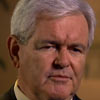Gene Sperling Director, National Economic Council, 1996-00
One point I would make, to make a general point, there is a certain industry out there of people who simply tell politicians to do something about the deficit as if it were easy; as if they were just asleep at the switch; as if they hadn't thought of it before.
The truth is, these are extremely difficult choices, and while it might make everybody feel good to have a president or speaker of the House give a brutal speech or proposal to reduce the deficit, if it's not politically savvy, if it doesn't build support well, it just dies on the vine and doesn't get anything done.
It's easy on the outside to just say: "What's the matter with those bums? Why don't they just bring the deficit down?" But when you're in there, bringing the deficit down may mean cutting programs that are really dear to peoples' hearts -- it could be for veterans or education or for health care. Well, that's a lot more complicated, and it's a lot more difficult.
So I don't want to let our political leaders off the hook, but I don't think that anybody should think that it's just a simple exercise. Often a deficit-reduction plan is something that nobody likes but everybody dislikes equally. There isn't this easy waste that's out there that everybody just forgot to cut. And so you have to figure out, what's the package you can put together? And that package may mean putting together some very positive things that can get support for a budget plan with some tough medicine. And if you look at 1993, you saw a bit of that. You saw some difficult Medicare, Medicaid savings, but you also saw a big increase in education and the Earned Income Tax Credit. These things have to come together. The same could happen with health care. ...
I'd like for you to talk about that from the inside. Paint a picture of what it was like. ...
It was an eight-month white-knuckler. I mean, it was just hand-to-hand combat, just battling each and every step of the way. And that's the important thing for people to know: This is not easy, and this doesn't look pretty. ...
The thing about 1993 was that it was the one time in the last quarter century where one party decided to go it alone. In 1983, with Social Security, it was bipartisan. In 1990, the deficit reduction package was bipartisan. 1997, the one we did later, was with [then-Speaker of the House] Newt Gingrich [R-Ga.] and bipartisan. But in 1993, the Republicans announced pretty early, "Democrats control government; you're on your own." ...
So that meant you had very little margin for error. You had to pass it solely with Democrats in both the House and the Senate. And you have Democrats from different parts of the country who have different sensitivities. Some thought that we were cutting the deficit way too much and were sacrificing a more progressive agenda. Others, like [Sen.] Bob Kerrey from Nebraska, thought that we were not going far enough.
And we're in the middle at each step, through each committee -- through the House, through the Senate, through the conference committee. We're in that place trying to juggle, trying to put it together, trying to barely get that majority plus one so that we could pass this.
Alice Rivlin Director, Office of Management and Budget, 1994-96

[What] made it easier for the Clinton administration to work on the budget deficit … was that we inherited from President Bush senior the budget rules which had been put together in 1990. … Basically two: One was caps on discretionary spending, the spending that Congress votes every year.
And the other was an even more helpful rule, which was called the PAYGO rule: Pay as you go. That said, essentially, that you couldn't do a tax cut or a benefit increase under an entitlement program like Medicare or Social Security unless you had an equal and opposite proposal so it would not affect the deficit over the next five or 10 years.
And that meant that the president could say no, and the Congress could say no to a lot of good-sounding ideas, including Medicare prescription drugs. It's not that nobody thought of that in the '90s -- a lot of people thought of it, but we couldn't pay for it. To pay for it, we would have had to have done a tax increase, or cut out some other spending in major proportions. And nobody wanted to do that, so we didn't do it. …
What was the fate of PAYGO?
The rules, which were put in place in 1990, were extended a couple of times through 2002. But then they lapsed, and the Congress and the president did not want to put them back. The president wanted his big tax cuts, and putting PAYGO rules back in would've made that very difficult, especially the second tax cut. They wanted to do Medicare prescription drugs and they couldn't have done that under the PAYGO rules.
How did both parties have the political will to look beyond the current year to the future in the '90s? …
It came from the '80s. In the second part of the '80s the Congress and the president were facing very large deficits, large and growing. And they were having negative effects on the economy too. Interest rates were quite high -- that was linked to the deficit -- and there was a strong bipartisan will to get the deficit down.
The Congress experimented with several different mechanisms for forcing itself to do the unpleasant things. They had a mechanism called Graham-Rudman-Hollings which was complicated, and the bottom line is it didn't work. They weren't able to do it.
But the budget rules that they put into the agreement of 1990 were better rules. They weren't controlling the deficit, which is very hard to control because it's a product of spending and taxing and the economy and you can't predict it very well or control it very well in the near term anyway. They put the direct controls on spending and that works. And they did it.
Newt Gingrich Speaker of the House of Representatives, 1995-99
Because we had passed the balanced budget and because we'd actually gotten a fair amount done, in the summer/early fall of 1997, [Clinton Chief of Staff] Erskine Bowles, on behalf of the president, and Arne Christensen, who was my chief of staff, began having a very private conversation. ... We were actively collaborating together to try to get to very fundamental reform. We were looking at reform of Medicare and reform of Social Security.
Basically we had an agreement because he knew that there was a huge surplus coming, and he knew that the first instinct we had would be to cut taxes. And he said, "Well, how about instead of cutting taxes, what if we were to reform Social Security?" That struck me as a pretty good, pretty interesting opportunity.
And so we literally, in the fall of '97, had basically worked out an agreement that he would come to the Congress for the State of the Union in January 1998 and propose very bold changes -- obviously a little more liberal than I would favor, but nonetheless very bold -- and that I would then be very positive and say, "Yes, we should start hearings," and I'd offer a somewhat more conservative version.
I actually went to the Cobb County Chamber of Commerce in January 1998 and outlined the kind of changes that I thought were possible. And tragically, I think the whole [Monica] Lewinsky affair just destroyed it, made it impossible. But there was a brief period when it looked as though we might have a second big wave of reform that would have put us on a very different track than we are right now. ...
What were the broad outlines of this?
We were basically going to move toward a substantial, more personal choice of Medicare, and we were going to move toward having a savings component built into Social Security. There have been a lot of arguments about the details, but I think that the principle of talking that through was really a very big step in a direction that would have been very healthy for the country.
And that would have put Social Security and Medicare on the path to solvency?
Yeah, our goal was to try to get it into solvency in the 50-year range, which is actually pretty theoretical. ...
Apparently there was a meeting just before the news of Lewinsky broke?
... I think it was maybe a month before, but we had a private session. All of this, by the way, stayed secret for about a decade, and none of the participants ever went out and blabbed about it, because we were really trying to do something that wasn't a hotdog thing. It wasn't a PR thing. It was, you know, if you had the ability in a rare moment to have the people who had power and who had responsibility actually sit down together in private and talk through things.
Now, whether I could have carried my party and whether he could have carried his party I don't know. That would have been the next step. But we certainly had talked out a framework that would have, I think, surprised almost everybody in how willing we were to work together and define things. ...
... It must have taken a great deal of political courage. It seems to me that any great reform requires political courage. Can you speak to that?
Many years ago, I called Steve Hanser, who's been my mentor since 1973, and I said, "Why is it that some people take extraordinary risks?" And he said, "Because they're trying to change history, and so they're playing a totally different game."
I don't think either President Clinton or I would have said it took courage. I think we would have said, this is why we were in public life. If we had a chance to fundamentally solve a major problem for America, why wouldn't you do it? Politics is really hard. ... But if you can actually accomplish something -- balanced budget, the tax cuts, welfare reform -- that was worth a lot. That justified 20 years of my campaigning.
And I think President Clinton and I both had come out of a background -- were both relatively poor, we'd both risen in one generation -- and I think we kind of liked the idea [that] maybe we can put this thing together and do something real for the country. It was a genuine tragedy when it all fell apart. ...
... Would such an agreement like that be possible now?
I think with President Obama it might be possible. The key thing for President Obama is whether he wants to try to govern the House and Senate through Speaker [Nancy] Pelosi [D-Calif.] and [Senate] Majority Leader [Harry] Reid [D-Nev.], in which case it will be very hard for him to create that kind of bipartisanship, or whether he's willing to actually reach out directly to Republican [House Minority] Leader [John] Boehner [R-Ohio] and Republican [Senate Minority] Leader [Mitch] McConnell [R-Ky.].
I think that Senator Obama's record when he was the editor at the Harvard Law Review was one of conciliating, bringing people together, trying to get things done. If he wants to go down that road, I think he'll find a lot of Republicans who feel that patriotism and national duty require them to try to work with him if there's a way to do it.
Marjorie Margolies-Mezvinsky One-term Rep. (D-Penn.); her defeat is blamed on her deciding vote which passed President Clinton's 1993 budget

This is Aug. 5, 1993. Bill Clinton has just come to office with this landmark [budget] legislation. Why is this so critical to his presidency?
… What Clinton was saying was that if we do not tackle the deficit, and ultimately the debt, we are going to be in serious trouble. … When I got down [to Congress], I looked at it. I thought that part of the bill was good, part of it wasn't. I said I was very much concerned about entitlements and the fact that we didn't make cuts that were deep enough. …
On that day when it sounded like [the bill] was going down I felt that it was very important that we give this president a chance.
Going into that, is it fair to say that you were concerned first and foremost about your political career, and you knew what that vote would do?
… I wasn't concerned first and foremost about my political career with regard to this vote. I knew that it was a very important one. I knew that we came in '92 pretty much as a team hoping that we could make some serious change. I knew that if I voted for it, it would be a tough election. …
I was just surprised that it was so partisan. Bob Michel [R-Ill.] talked to his caucus -- actually it was to both sides -- and he said: "This has to pass; we know this. But you're not going to get one Republican vote."
When I walked in that night, the Republicans were high-fiving because they said, "They don't have the votes," and the Democrats were talking about switching their votes. And I said: "Guys, you've got to be kidding. This is an essential piece of legislation. Yeah, there are some parts of it that we don't like. There are some things that don't have any shelf life." … I was just surprised at how many people didn't understand how important this was to us and to this administration.
… Walk me through this. The president wrangles and wrangles and wrangles and this is the bill that they want. Leadership has gone along with it.
And it is very likely, which was what was persuasive to me at least intellectually, that we were going to go back, we were going to wrangle and wrangle for the next X number of months, and we weren't going to move on. We weren't going to get to the crime bill. We weren't going to get to health care. And we weren't going to come up with anything that was significantly different.
… Tell me what happened during this lead up to the final vote.
There were arguments on both sides. … My constituents were calling in -- and you may know that constituents don't usually call in when they are happy. … At some point you go into your office, you close the door and you decide how you're going to vote. …
Go there. The vote's now about to start. From the time you enter the chamber, tell me what you see and what you hear.
… I walked in and people were saying, "The votes aren't there." Some of the Democrats I heard said, "Well, I don't know if I'm going to be able but keep my vote."
Someone said that the president was on the phone and so I went into one of the antechambers. I don't really remember what I said, but it was in the nature of, what would it take? And I said: "I have problems with this for two reasons: One, we don't address entitlements and the cuts aren't large enough. If I can get some assurance that there will be a serious attempts to cut without pushback from the White House and that we can tackle entitlements in a very serious way … then I will be your last vote." …
… You knew what you were saying?
Oh yeah. I think I said: "I'm surprised you're coming to me. There is a really good chance that you're going to lose this seat. … But if you need me, I'll be there." …
Looking back over the years, what's the legacy of this piece of legislation and out of that period?
I think that most people who look at that period, the '90s, as being so strong financially and ending up with that extraordinary surplus that we had before the Bush administration started -- I think most folks who know anything about finance will say that's where it started. That was the day that it started.



